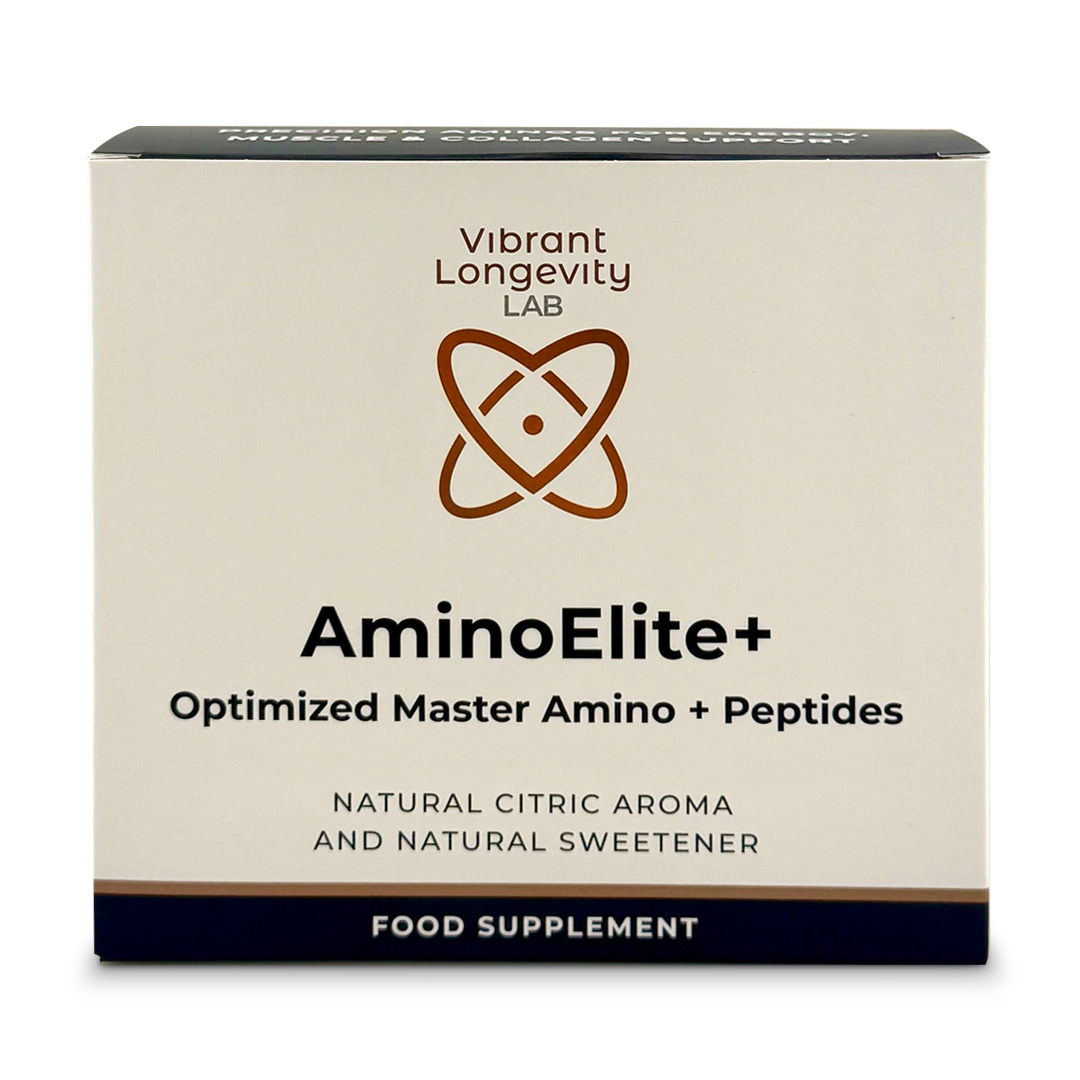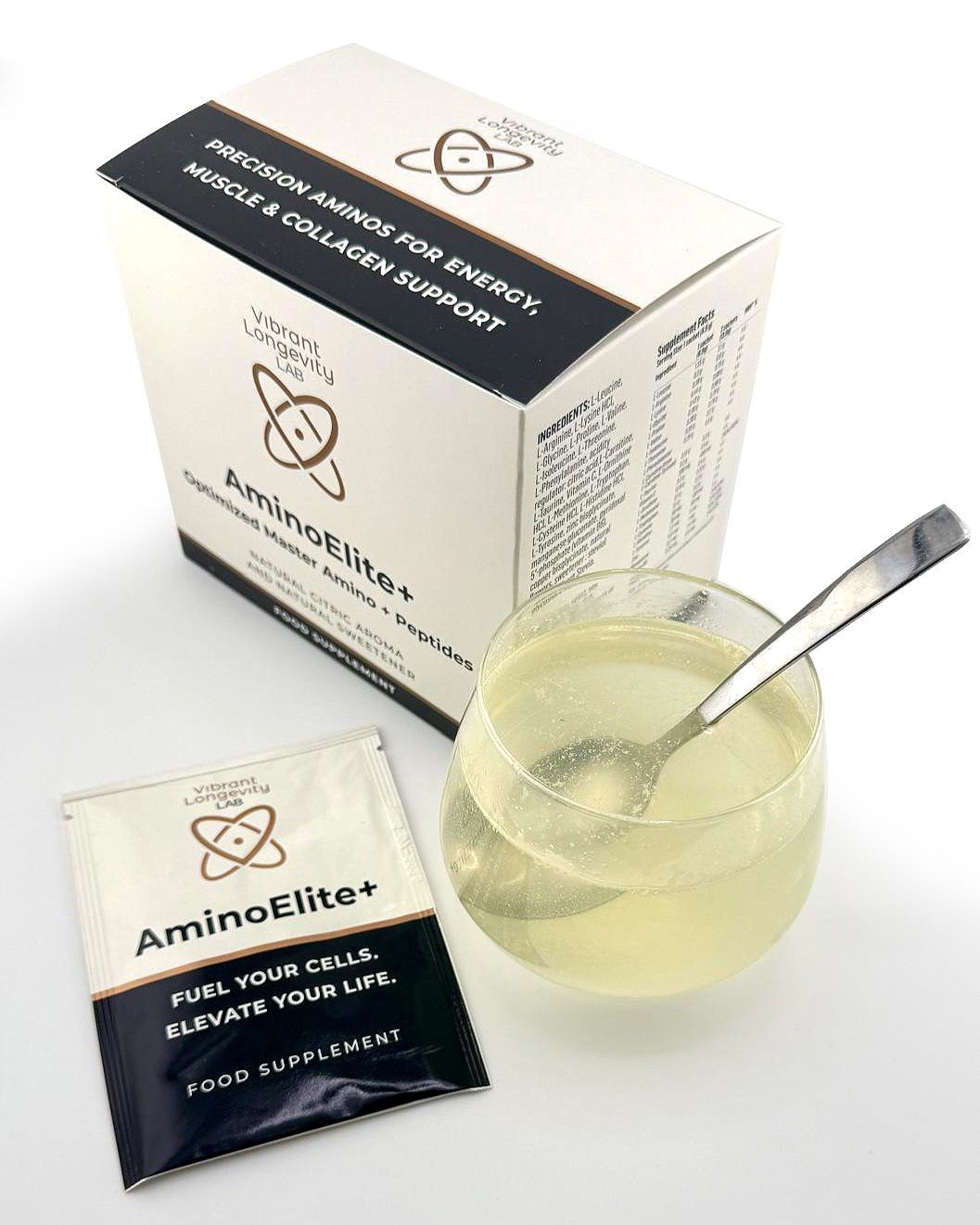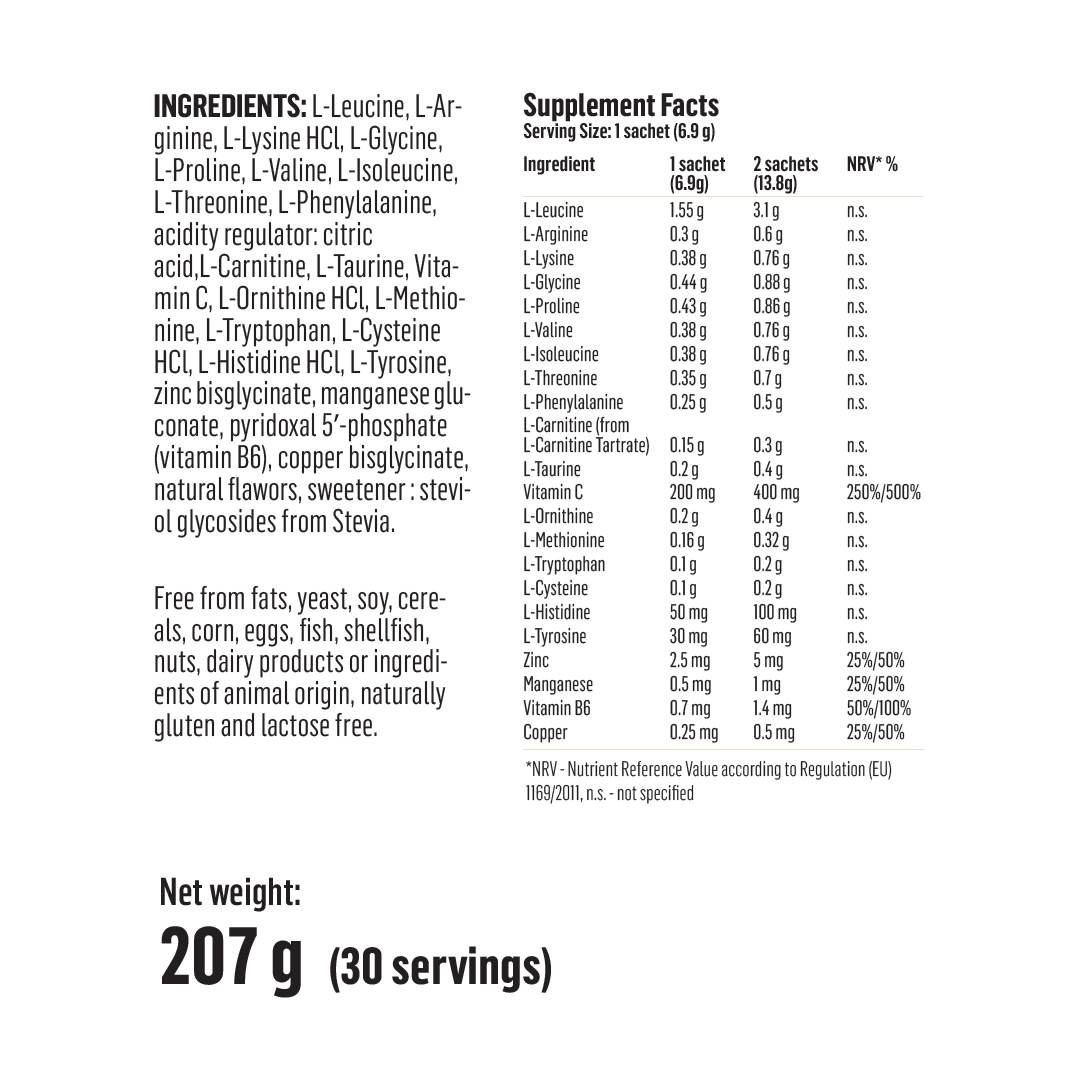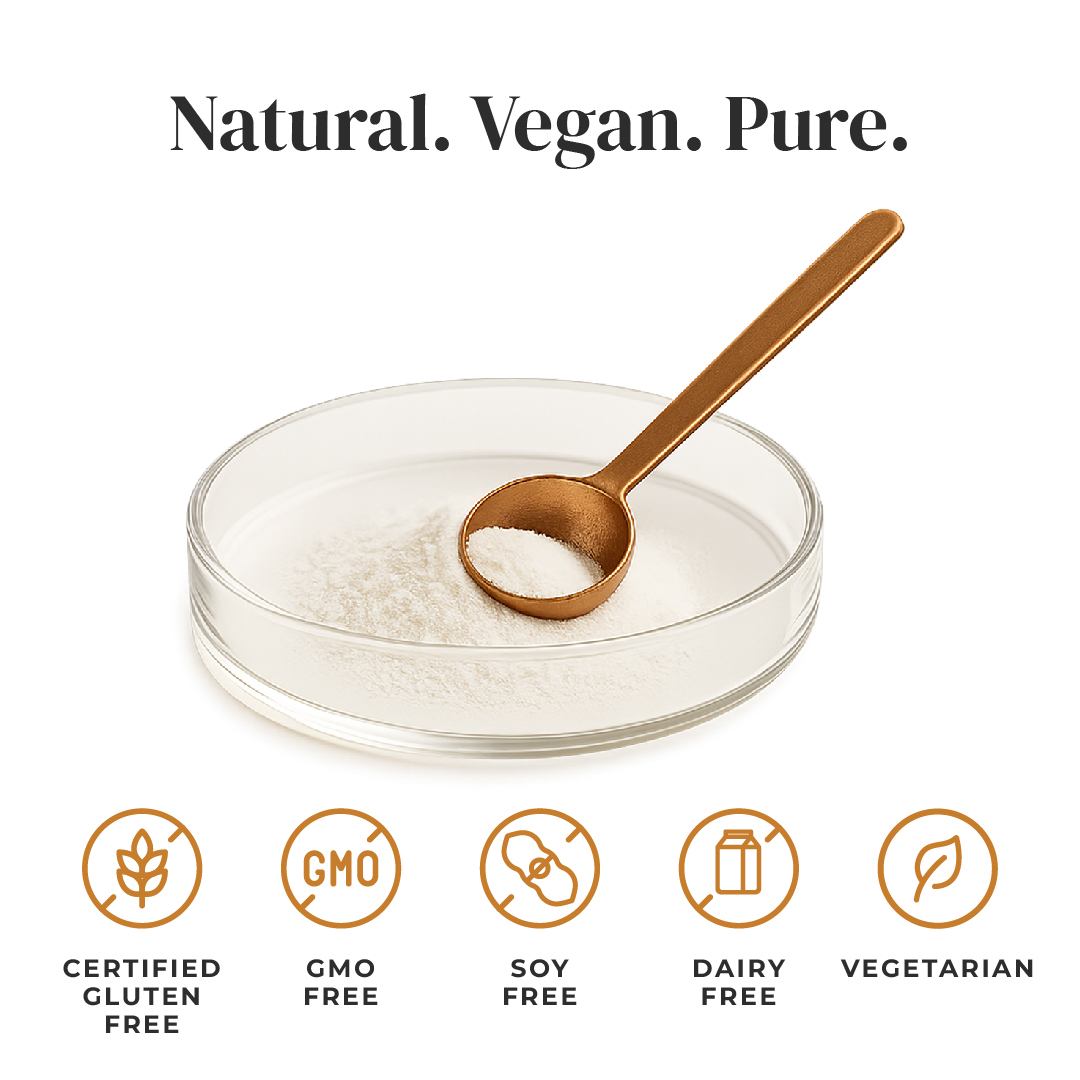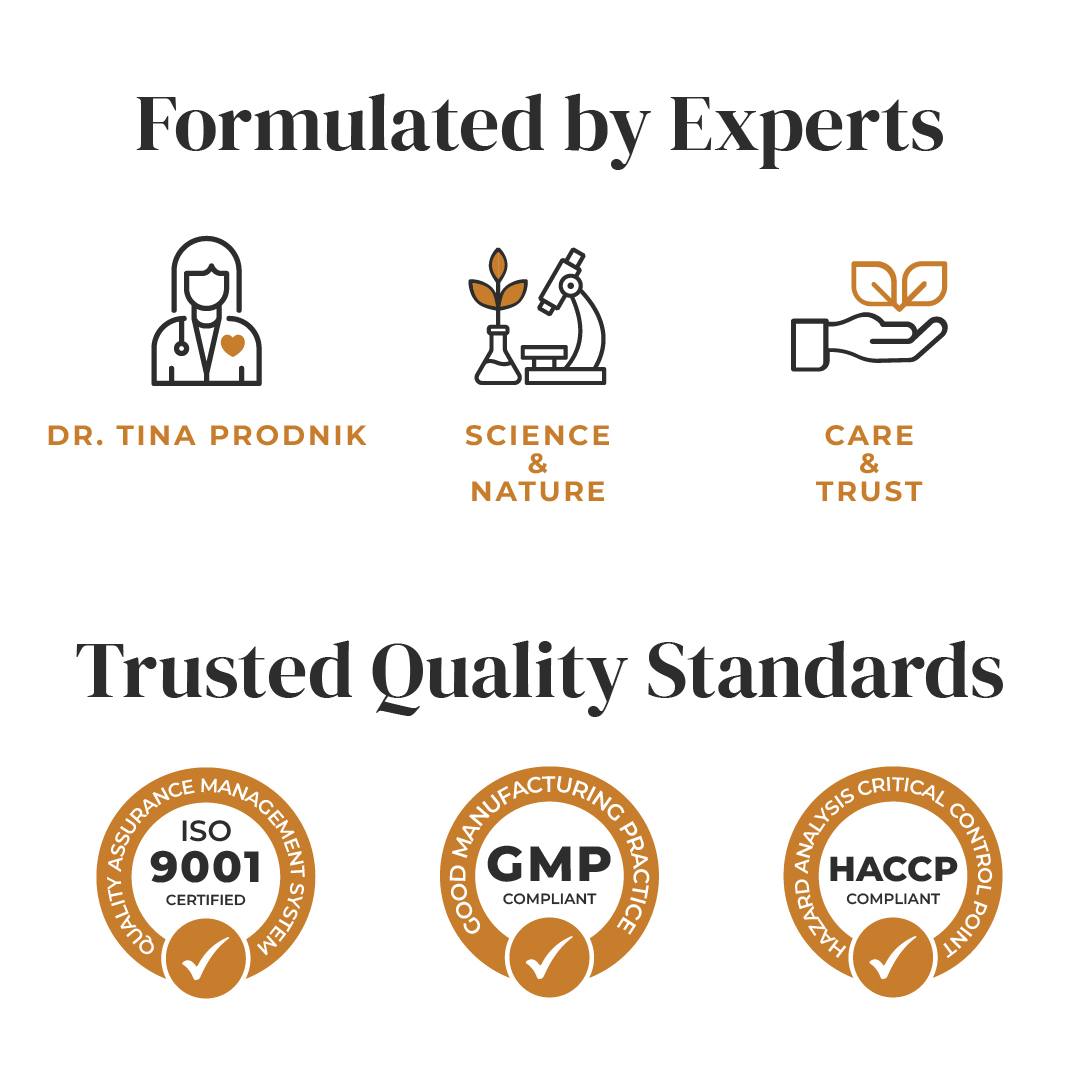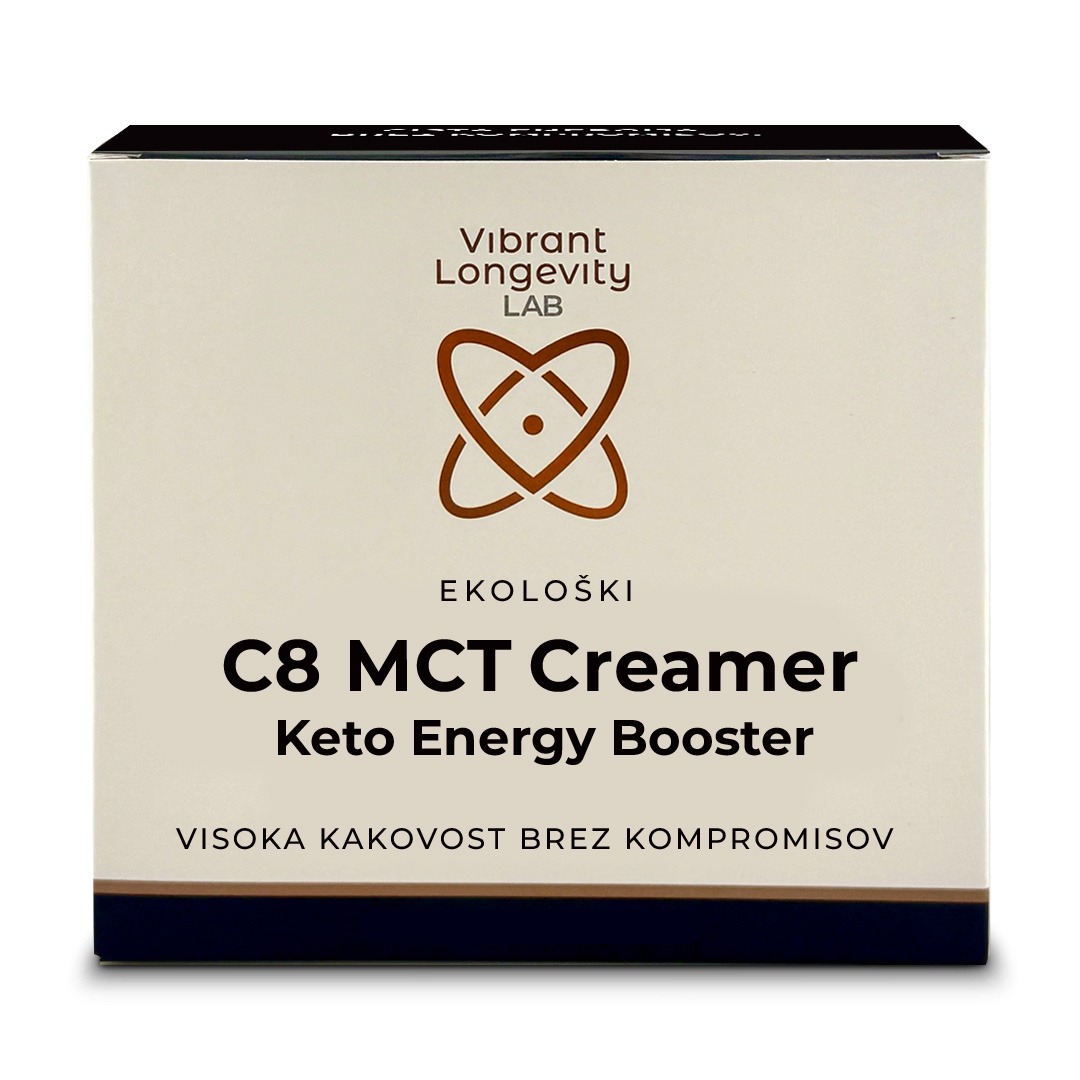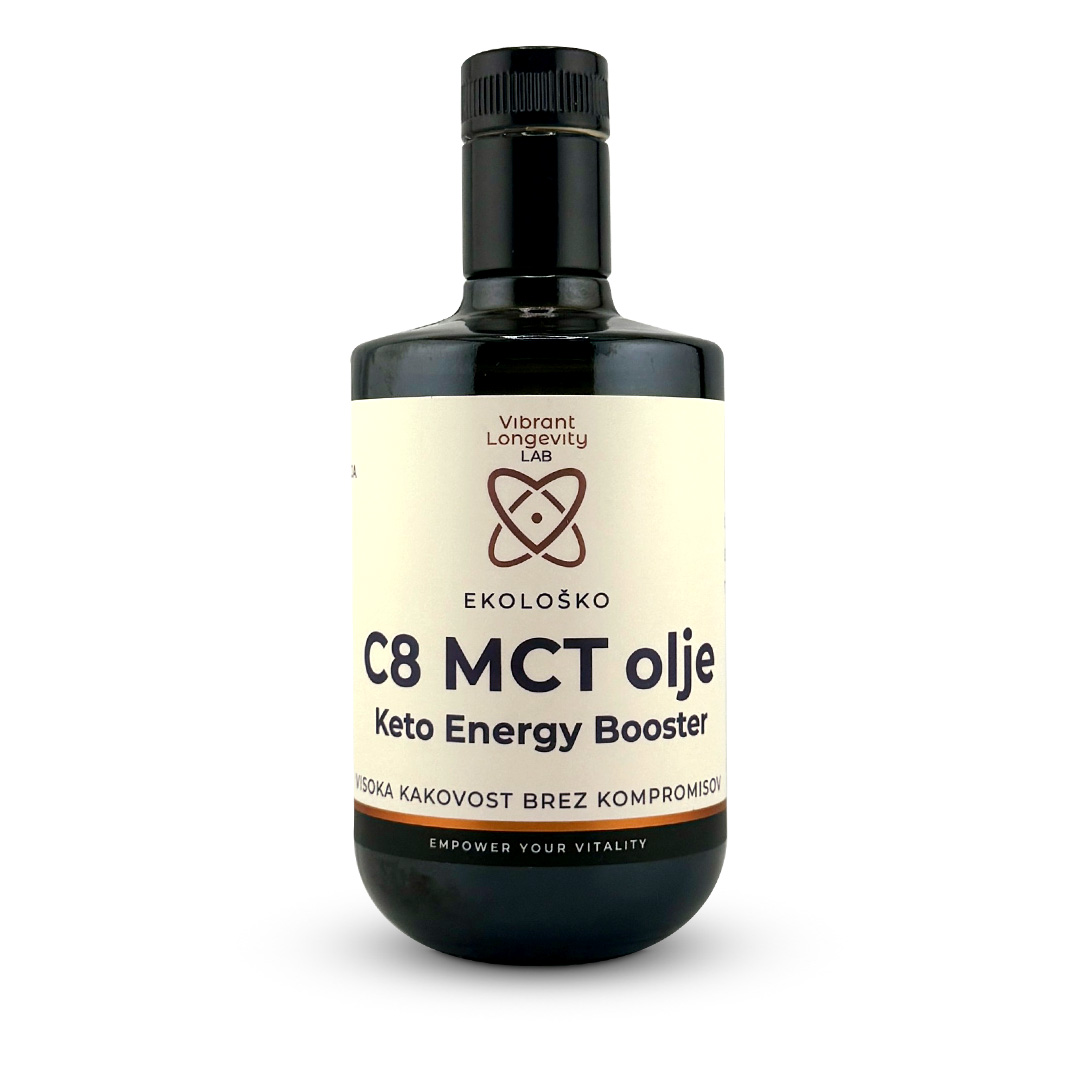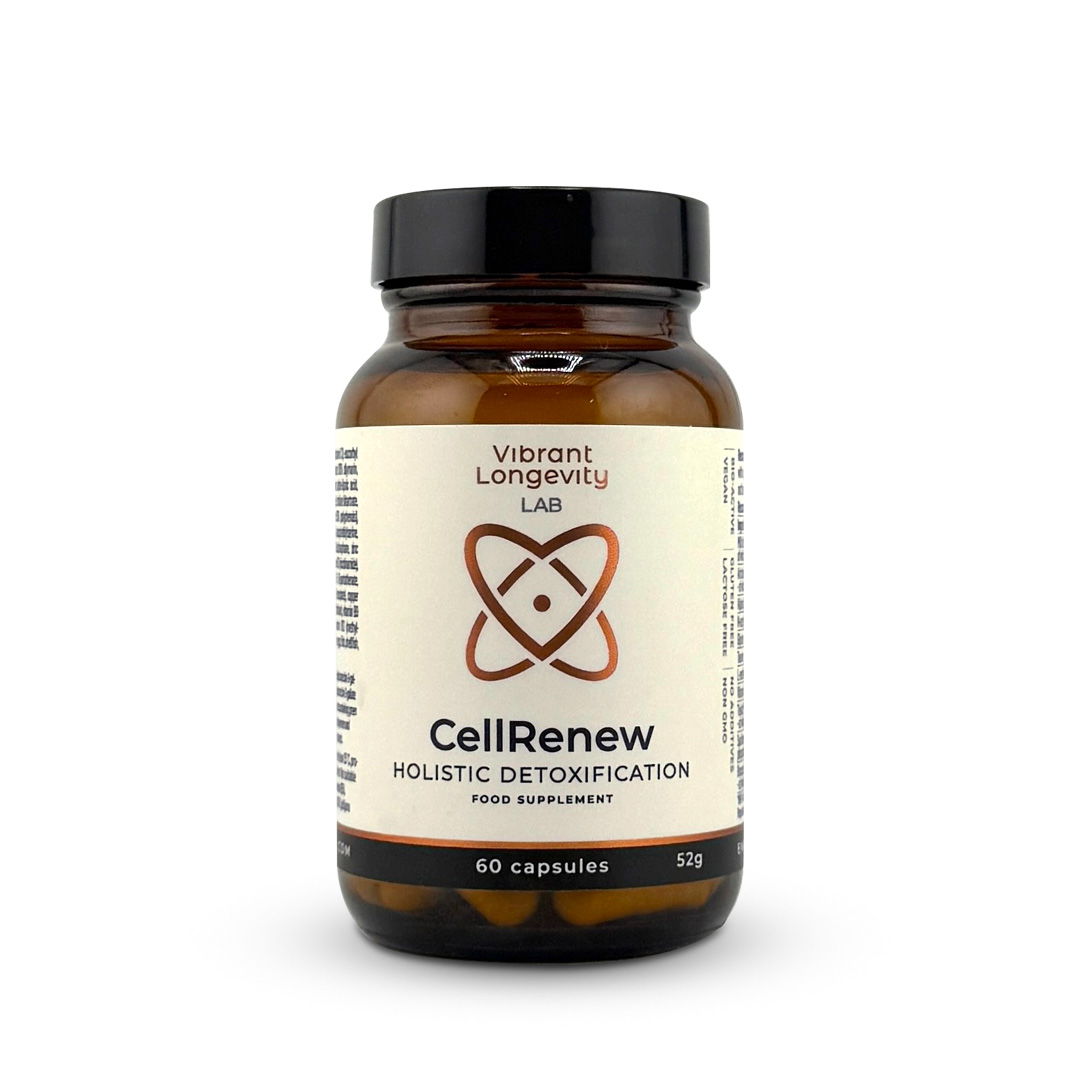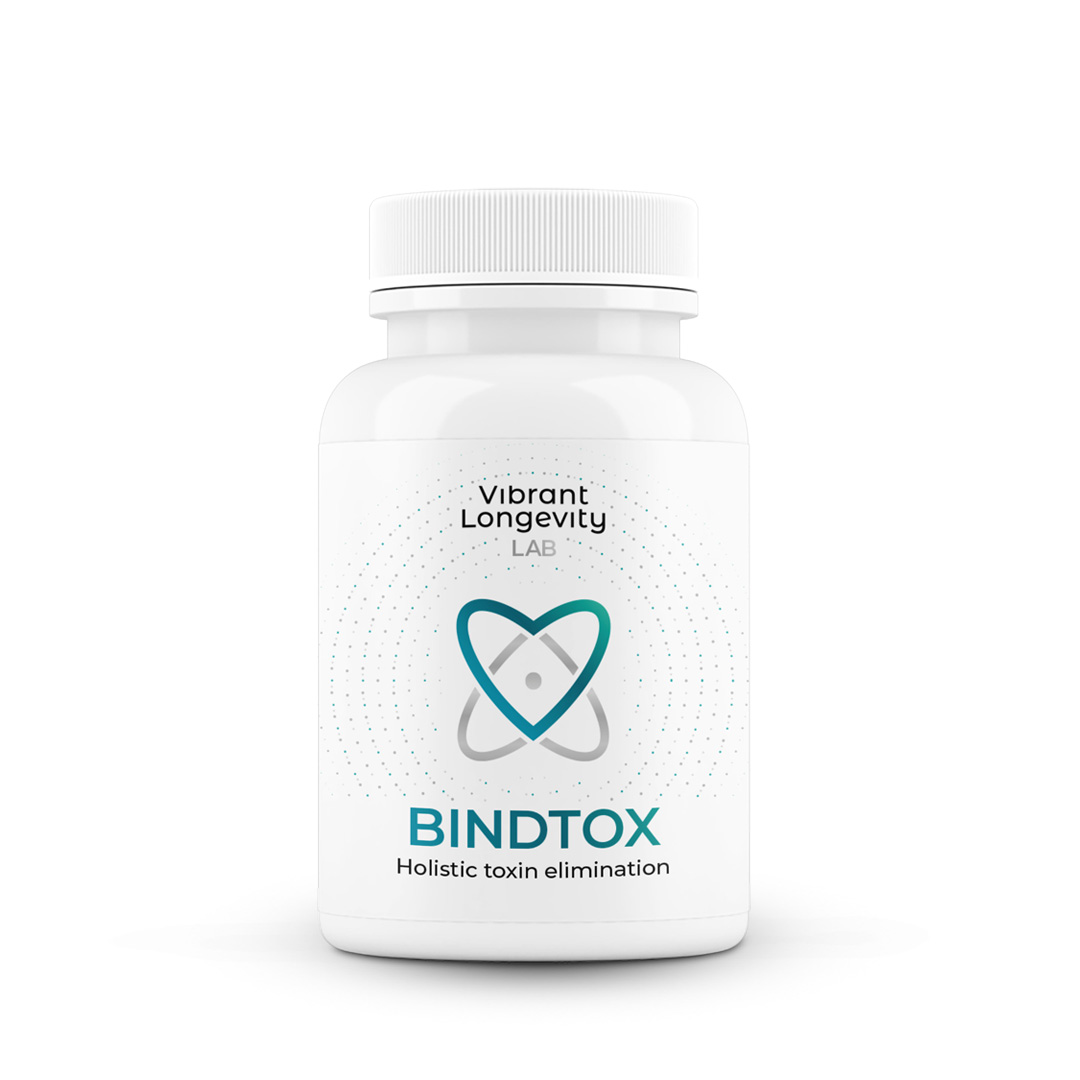Amino Acids AminoElite +
Dietary supplement
AminoElite+ represents a bridge between nutrition and a functional supplement – an advanced formula in the form of a drink with a natural citrus flavor and natural sweetener. It contains 22 active ingredients, including essential amino acids, BCAA (4:1:1), L-carnitine, taurine, vitamin C, vitamin B6 and minerals zinc, copper and manganese.
- Optimized Essential Amino Acid Profile – designed and upgraded based on the MAP concept for a balanced intake.
- BCAA ratio of 4:1:1 – with a higher proportion of leucine compared to isoleucine and valine.
- Readily available amino acids – fermented and in free form, without the need for digestive breakdown.
- High nitrogen yield (NNU) – with minimal production of metabolic waste and less burden on the body.
- Collagen and connective tissue – vitamin C, copper, zinc and manganese contribute to collagen formation and the maintenance of normal connective tissue.*
- Energy and cell protection – vitamin C, B6, zinc, copper and manganese support energy metabolism and protect cells from oxidative stress.*
- Pure and vegan formula – no artificial flavours, colours or fillers, also suitable for sensitive individuals.
- 30 days of regular use – a net amount of 207 g is sufficient for 30 days.
Free
delivery over 50 €
Fast
Delivery
100% guarantee
To your satisfaction
Free
delivery over 50€
100 %
warranty
Delivery in
48 hours
The package contains 60 capsules for 30 days of regular use. Recommended daily dose: two capsules per day, one with breakfast and one with dinner, taken with some water.
Important announcements!
The recommended daily amount or dose should not be exceeded.
A food supplement is not a substitute for a balanced and varied diet and a healthy lifestyle. Dietary supplements cannot replace prescription drugs. If you have any health problems, consult your doctor before taking dietary supplements.
To keep out of reach of children. Not suitable for pregnant and lactating mothers.
Store below 25 °C, protected from moisture and light.
Formulation by Dr. Tina Prodnik
Development under the guidance of an integrative medicine expert.
The highest EU standards
Produced according to HACCP, GMP and ISO guidelines – without GMOs, dyes or sweeteners.
Independently tested
Analysed in EU certified laboratories for purity, quality and safety
Formulation by Dr. Tina Prodnik
An expert in integrative medicine.
The highest EU standards
Produced in the EU according to HACCP, GMP and ISO.
Independently tested
Analysed in EU laboratories for purity, quality and safety
Why do we need amino acids daily?
Amino acids – the basic building blocks of proteins and the foundation of vital processes in the body. The body needs them to make muscles, enzymes, hormones, neurotransmitters, and connective tissues.
Essential amino acids, which the body cannot produce on its own, are particularly important – so we need to consume amino acids daily through our diet.
A sufficient and balanced intake of all essential amino acids is essential for:
maintaining muscle mass,
tissue repair and regeneration,
collagen formation,
metabolism, immune system and cognition.

Do we consume enough amino acids?
Even with adequate protein intake, the supply of all amino acids can be questionable.
A deficiency of a single essential amino acid can limit protein synthesis in the body. This can happen in different situations:
- Vegan or vegetarian diets often do not provide all amino acids in the right proportions.
- Poorer digestion (e.g. low stomach acid, dysbiosis, ageing) may reduce protein breakdown and absorption.
- Increased needs – in sports activity, chronic stress, recovery or after the age of 40 – can exceed the availability of amino acids from the usual diet.
- Aging after the age of 40 It reduces muscle protein synthesis and increases the need for key building blocks.
Adequate nutritional support with amino acids in optimal proportions can be an important part of your lifestyle – contributing to the maintenance of muscle mass, tissue support and overall well-being.
Read more
Amino acids – the building blocks of life
Amino acids are the basic building blocks of proteins and are involved in many key functions in the body. Our body needs 20 different amino acids, which are transported by the blood to tissues and organs, where they contribute to protein synthesis, muscle repair, the production of enzymes, hormones, neurotransmitters and immune cells.
Protein makes up about 20% of body weight – it is included in muscles, skin, nails, hair, blood and internal organs. Essential amino acids, which the body cannot produce on its own, must be obtained daily through the diet – their availability affects regeneration, metabolism, muscle mass and cognitive performance.
Do we consume enough amino acids daily?
In the modern lifestyle, the intake of amino acids is often not optimal – due to a monotonous or low-digestible diet, reduced stomach acid production, aging, stress or increased needs (e.g. during sports activity, regeneration or after the age of 40).
Even with a seemingly sufficient protein intake, a relative deficit of individual amino acids can occur, which limits protein synthesis and thus affects the restoration and functioning of the body.
How effective is the intake of amino acids from food?
Not all foods contain all essential amino acids in the right proportions, and some dietary proteins are less digestible. The most common sources – such as meat, dairy, eggs or legumes – are digested slowly, often for more than three hours, and their bioavailability can be limited.
The biological value of proteins is assessed using methods such as PDCAAS and DIAAS, which take into account the digestibility and availability of amino acids. When intake is not optimal, excess protein can be consumed as an energy source or excreted as nitrogen metabolites – placing an additional burden on the liver, kidneys and metabolic pathways.
Amino acids in free (crystalline) form
Scientific studies show that free amino acids in pure, crystalline form are absorbed faster and more efficiently than complex proteins from food. Because they do not require digestion for absorption, they can quickly enter the bloodstream, where they are directly used by the body for protein synthesis, tissue repair, muscle regeneration, and metabolic support.
Such formulations can be a useful addition to a balanced diet, especially during periods of increased physical or metabolic load.
When is nutritional support with amino acids especially beneficial?
The addition of amino acids in free form may make sense in the following cases:
After the age of 40: As we age, muscle mass and the ability to synthesize proteins decline, which affects strength, mobility and regeneration. Additional support with amino acids can help maintain vitality and functional performance.
When managing weight: During an energy deficit (e.g. weight loss), it is important to maintain muscle mass and metabolic activity.
On a vegan or vegetarian diet: Plant foods often do not contain all the essential amino acids in optimal proportions. Quality supplements can help fill nutritional gaps.
In sports activity: Amino acids support regeneration, repair of muscle tissue and maintenance of physical performance.
For people with sensitivities or intolerances: Free amino acids do not contain gluten, lactose, milk protein, soy or nuts – so they are also suitable for people with sensitive digestion or dietary restrictions.
- Wu, G. (2009). “Amino acid metabolism.” Annual Review of Nutrition, 29, 41-67. DOI: 10.1146/annurev-nutr-080508-141056.
- Jackman, S. R., Witard, O. C., Jeukendrup, A. E., & Tipton, K. D. (2017). “Branched-chain amino acids and muscle protein synthesis in humans: myth or reality?” Journal of the International Society of Sports Nutrition, 14(1), 30. DOI: 10.1186/s12970-017-0184-9.
- Gu, D. L., Lu, Y., & Shi, L. (2022). “Lysine requirements of specific tissues and lysine-derived bioactive compounds: a clinical evidence-based approach.” Nutrients, 14(2), 333. DOI: 10.3390/nu14020333.
- Lu, S. C. (2009). “Methionine and S-Adenosylmethionine: Essential Links Between Metabolism and Transmethylation.” Nutritional Neuroscience, 12(2), 71-80. DOI: 10.1179/147683009X423417.
- Fernstrom, J. D. (2013). “Phenylalanine and brain function.” Psychiatry Research, 52(1), 111-118. DOI: 10.1016/j.psychres.2013.01.007.
- Li, P., Yin, Y. L., Li, D., Kim, S. W., & Wu, G. (2017). “Threonine metabolism: possible major pathways and their roles in human health.” Nutrients, 9(4), 353. DOI: 10.3390/nu9040353.
- Richard, D. M., Dawes, M. A., Mathias, C. W., Acheson, A., Hill-Kapturczak, N., & Dougherty, D. M. (2009). “The role of tryptophan in the control of feeding and behaviour.” Frontiers in Endocrinology, 35, 3-10. DOI: 10.3389/fendo.2009.00011.
- Proksch, E., Segger, D., Degwert, J., Schunck, M., Zague, V., & Oesser, S. (2014). “The Collagen Connection: Glycine, Proline, Hydroxyproline, and Arginine.” Advances in Nutrition, 5(5), 527-529. DOI: 10.3945/an.114.005090.
- Carr, A. C., & Maggini, S. (2017). “Vitamin C in health promotion and disease prevention.” Advances in Nutrition, 8(1), 31-41. DOI: 10.3945/an.116.012526.
- Mocchegiani, E., Costarelli, L., Giacconi, R., Piacenza, F., Basso, A., & Malavolta, M. (2007). “Vitamin B6 and immune competence.” Nutrients, 11(5), 292-301. DOI: 10.3390/nu11051175.
- Prasad, A. S. (2008). “Zinc in Human Health: The Effect of Zinc on Immune Cells.” Molecular Medicine, 14(5-6), 353-357. doi: 10.2119/2008-00033.Prasad.
- Burd, N. A., McKenna, C. F., Salvador, A. F., Paulussen, K. J. M., & Moore, D. R. (2019). Dietary protein considerations for muscle protein synthesis and muscle mass preservation in older adults. Nutrition Research Reviews, 32(2), 183-197. Retrieved from https://www.cambridge.org
- Gwin, J. A., Maki, K. C., Leidy, H. J., Dunn-Lewis, C., & Devkota, S. (2023). Is It Time to Reconsider the U.S. Recommendations for Dietary Protein and Amino Acid Intake? Nutrients, 15(4), 838. Retrieved from https://www.mdpi.com
- Lucà-Moretti, M. (1998). Net nitrogen yield of food supplements of type OKA. Internal Research Report on Amino Acid Utilization.
AminoElite+
Synergy of amino acids, vitamins and minerals
Protein synthesis for muscles and bones
Essential amino acids are a component of proteins that contribute to the maintenance of muscle mass and healthy bones.
Formation of collagen and connective tissues
Vitamin C contributes to the production of collagen for the normal function of the skin. Zinc and copper contribute to the maintenance of normal skin, hair and nails. Copper also contributes to the normal pigmentation of the skin and hair.
Skin, hair, nails and pigmentation
Vitamin C supports the skin through collagen production. Zinc and copper contribute to maintaining healthy skin, hair and nails. Copper also contributes to the normal pigmentation of the skin and hair.
More energy and less fatigue
Vitamin C and vitamin B6 contribute to the release of energy in metabolism, to the functioning of the nervous system and to the reduction of tiredness and exhaustion.
Nervous system function and cognitive support
Vitamin B6, copper, manganese and vitamin C contribute to the functioning of the nervous system. Vitamin B6 and zinc support psychological function, and zinc also support cognitive function.

Real experience, proven results

Majda A.
"As a vegan, the quality of my amino acids is important to me. AminoElite+ has become an indispensable part of my daily routine."

Dragica Č.
"With AminoElite+, it was easier for me to maintain my energy throughout the day. A great addition to an active lifestyle!"

Emanuel Š.
"After two months of use, I feel more focused and less tired during the day. The difference is noticeable!"
Why does Aminoelite+ work?
AminoElite+ contains a comprehensive complex of essential and conditionally essential amino acids, which are the building blocks of proteins and are important for muscle function, tissue repair and collagen synthesis.
In addition, the product contains selected micronutrients with scientifically confirmed effects:
Vitamin C, zinc, copper, manganese and vitamin B6:
* contribute to the normal functioning of the immune system,
*support energy metabolism and help reduce fatigue,
* contribute to the protection of cells from oxidative stress,
*and support the normal functioning of the nervous system.
AminoElite+ is designed as a nutritional support during periods of greater physical or mental stress, during an active lifestyle, or as an aid in regeneration and maintaining vitality.
- Money-back guarantee
A combination of 22 carefully selected active ingredients
Essential amino acids
It contains all nine essential amino acids, which are the building blocks of proteins and are involved in many biological processes in the body.
It contains L-isoleucine, L-leucine, L-lysine, L-methionine, L-phenylalanine, L-threonine, L-tryptophan, L-valine and L-histidine, which contribute to the maintenance and growth of muscle mass, tissue repair, enzyme synthesis, and the regulation of the immune and hormonal systems.

Amino acids for collagen synthesis
It contains amino acids present in the structure of collagen, along with micronutrients that support the formation and stability of connective tissue.
It contains vitamin C, which contributes to the normal formation of collagen for the normal function of the skin, cartilage, bones, teeth and gums, and copper, which contributes to the maintenance of normal connective tissue.

Selected vitamins and minerals for additional body support
It contains bioavailable forms of micronutrients and the amino acids L-carnitine and taurine, which complement the action of the formula.
It contains zinc bisglycinate (zinc), copper bisglycinate (copper), manganese gluconate (manganese), ascorbic acid (vitamin C) and pyridoxal-5′-phosphate (the active form of vitamin B6), which contribute to the reduction of fatigue and the protection of cells from oxidative stress.

Read more
AminoElite+ consists of a carefully selected combination of “pharmacy grade” amino acids from pure plant sources in free crystalline form.
Your body produces hundreds of amino acids, but it can’t produce the nine amino acids you need on its own. These are essential amino acids that need to be obtained from the food consumed.
Vitamin C
· contributes to the normal function of the immune system
· contributes to the maintenance of normal skin, hair, nails and bones
· contributes to normal fertility and reproduction
· contributes to the preservation of vision
· contributes to the protection of cells from oxidative stress
· contributes to the normal metabolism of acids and bases
· contributes to normal DNA synthesis
· plays a role in the process of cell division
· contributes to normal cognitive functioning
· contributes to the metabolism of fatty acids, macronutrients, vitamin A
Vitamin B6
· contributes to the normal functioning of the nervous system
· contributes to normal energy metabolism
· contributes to normal psychological functioning
· contributes to the normal function of the immune system
· contributes to the reduction of tiredness and exhaustion
· contributes to the regulation of hormones
· contributes to the normal synthesis of cysteine
· contributes to normal protein and glycogen metabolism
· plays a role in the formation of red blood cells
· contributes to the metabolism of homocysteine
Zinc
· contributes to the normal function of the immune system
· contributes to the maintenance of normal skin, hair, nails and bones
· contributes to normal fertility and reproduction
· contributes to the preservation of vision
· contributes to the protection of cells from oxidative stress
· contributes to the normal metabolism of acids and bases
· contributes to normal DNA synthesis
· plays a role in the process of cell division
· contributes to normal cognitive functioning
· contributes to the metabolism of fatty acids, macronutrients, vitamin A
Manganese
· contributes to the normal formation of connective tissue
· contributes to the maintenance of healthy bones
· contributes to normal energy metabolism
· contributes to the protection of cells from oxidative stress
Copper
· contributes to the maintenance of normal connective tissue
· contributes to the normal functioning of the nervous system
· contributes to normal skin and hair pigmentation
· contributes to the normal transport of iron in the body
· contributes to the protection of cells from oxidative stress
· contributes to normal energy metabolism
· contributes to the functioning of the immune system
Wu, G. (2009). “Amino acid metabolism.” Annual Review of Nutrition, 29, 41-67. DOI: 10.1146/annurev-nutr-080508-141056.
Jackman, S. R., Witard, O. C., Jeukendrup, A. E., & Tipton, K. D. (2017). “Branched-chain amino acids and muscle protein synthesis in humans: myth or reality?” Journal of the International Society of Sports Nutrition, 14(1), 30. DOI: 10.1186/s12970-017-0184-9.
Gu, D. L., Lu, Y., & Shi, L. (2022). “Lysine requirements of specific tissues and lysine-derived bioactive compounds: a clinical evidence-based approach.” Nutrients, 14(2), 333. DOI: 10.3390/nu14020333.
Lu, S. C. (2009). “Methionine and S-Adenosylmethionine: Essential Links Between Metabolism and Transmethylation.” Nutritional Neuroscience, 12(2), 71-80. DOI: 10.1179/147683009X423417.
Fernstrom, J. D. (2013). “Phenylalanine and brain function.” Psychiatry Research, 52(1), 111-118. DOI: 10.1016/j.psychres.2013.01.007.
Li, P., Yin, Y. L., Li, D., Kim, S. W., & Wu, G. (2017). “Threonine metabolism: possible major pathways and their roles in human health.” Nutrients, 9(4), 353. DOI: 10.3390/nu9040353.
Richard, D. M., Dawes, M. A., Mathias, C. W., Acheson, A., Hill-Kapturczak, N., & Dougherty, D. M. (2009). “The role of tryptophan in the control of feeding and behaviour.” Frontiers in Endocrinology, 35, 3-10. DOI: 10.3389/fendo.2009.00011.
Proksch, E., Segger, D., Degwert, J., Schunck, M., Zague, V., & Oesser, S. (2014). “The Collagen Connection: Glycine, Proline, Hydroxyproline, and Arginine.” Advances in Nutrition, 5(5), 527-529. DOI: 10.3945/an.114.005090.
Carr, A. C., & Maggini, S. (2017). “Vitamin C in health promotion and disease prevention.” Advances in Nutrition, 8(1), 31-41. DOI: 10.3945/an.116.012526.
Mocchegiani, E., Costarelli, L., Giacconi, R., Piacenza, F., Basso, A., & Malavolta, M. (2007). “Vitamin B6 and immune competence.” Nutrients, 11(5), 292-301. DOI: 10.3390/nu11051175.
Prasad, A. S. (2008). “Zinc in Human Health: The Effect of Zinc on Immune Cells.” Molecular Medicine, 14(5-6), 353-357. doi: 10.2119/2008-00033.Prasad.
The product is free of artificial additives!
Does not contain: flavours, additives, yeast, soy, cereals, maize, eggs, fish, shellfish, nuts,
dairy products or ingredients of animal origin; gluten-free and lactose-free.
The science behind it – the results at the forefront

Formulation –
Ph.D.
Dr. Tina Prodnik leads product development and brings together international experts in the formulation, selection of ingredients and testing of the final product.

Ingredients–
Clinical studies
The products include carefully selected – even branded – ingredients, backed by scientific research to ensure effectiveness and safety.

Testing–
Independent laboratories
We test the ingredients in independent laboratories in the EU, where we check the quality, the presence of heavy metals, gluten and microbiological purity.
Our commitment – the highest standards for you
Expertly designed, affordable
Our products combine science-based formulations and superior quality at affordable prices – to make solutions accessible to a wide range of people.
The highest quality standards in the EU
Manufactured and packaged in the European Union in accordance with strict HACCP, GMP and ISO 22000:2018 standards, ensuring the highest level of quality and safety.
Purity of formulations without additives
The products are made from high-quality active ingredients and do not contain unnecessary fillers, artificial flavors, dyes, preservatives or titanium dioxide.
Sustainability and plant-based approach
Most of the products are vegan and packaged in plant-based HPMC capsules. Where possible, we use environmentally friendly packaging materials.
Free of GMOs, gluten and common allergens
The products are free of soy, gluten, lactose or other common allergens and are free of genetically modified organisms (GMOs).
Easy to use
Start your day with a functional amino acid drink with a natural mild citrus flavour – no artificial flavours, colours or unnecessary additives.
1. Measure
Take one sachet (6.9 g) of AminoElite+.
2. Prepare
Mix the contents of the AminoElite+ sachet with 200 ml of water. Mix well with a spoon or use a shaker.
*Recommended for additional anti-inflammatory support:
Pour 200 ml of water into a blender, add turmeric, a slice of lemon and ginger. Mix until smooth, then add the contents of the AminoElite+ sachet.
3. Support the body
Enjoy it as part of your morning routine – for energy, regeneration and vitality, as well as after physical or sporting activity.
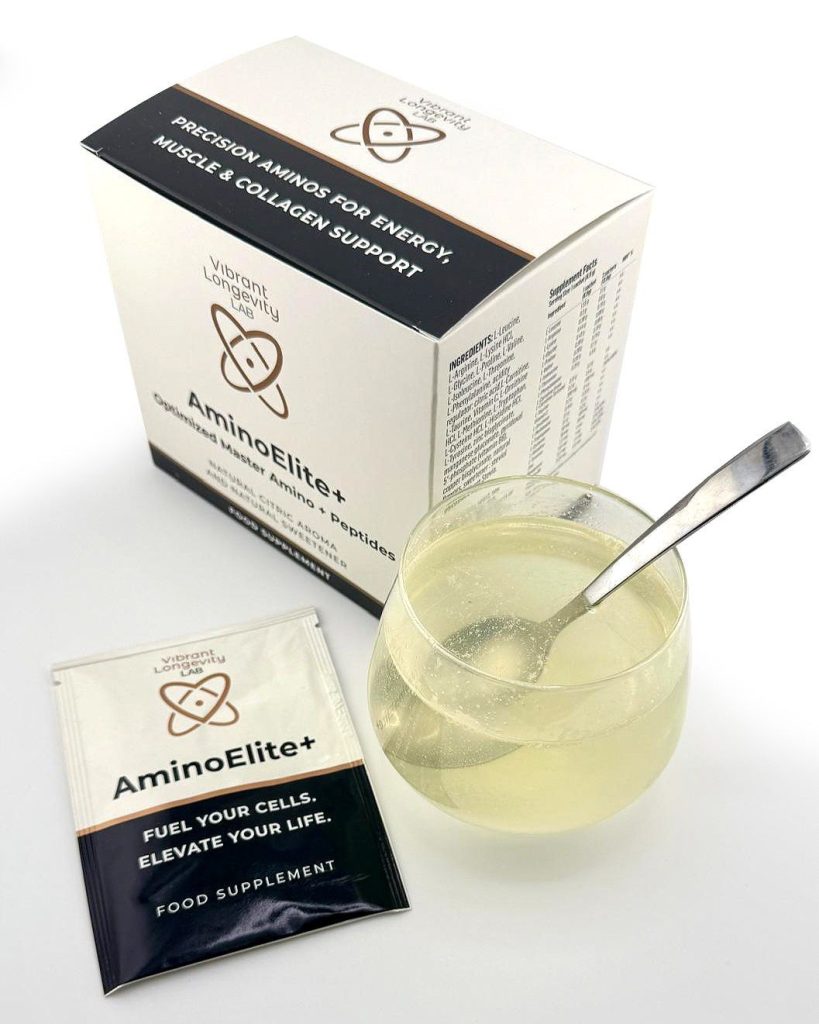
Learn more about using
Instructions for use
Net quantity: 207 g (30 sachets)
Recommended daily dose:
Mix the contents of 1 sachet of AminoElite+ with 200 ml of water. Mix well with a spoon or use a shaker.
*Recommended preparation for additional nutritional support:
Pour 200 ml of water into a blender, add turmeric, a slice of lemon and ginger. Mix until smooth, then add the contents of the AminoElite+ sachet and give another quick stir.
In addition to sports or physical activity:
If necessary, take an additional 1 sachet – 30 minutes before or immediately after exercise, or after consulting your doctor or pharmacist.
Important notices
The recommended daily dose should not be exceeded.
A food supplement is not a substitute for a balanced and varied diet and a healthy lifestyle.
Store at a temperature of up to 25 °C, protected from moisture and light.
Keep out of reach of children.
If you have health problems or are taking medications, talk to your doctor or pharmacist before use.
AminoElite+ bridge between nutrition and functional supplement!
- Money-back guarantee
Answers to frequently asked questions
Can I take amino acids everyday?
Yes. AminoElite+ is formulated to be taken daily and supplemented with essential amino acids that the body cannot produce on its own. Regular use supports regeneration, muscle function and metabolic balance.
Can I take AminoElite+ amino acids together with other dietary supplements?
Yes, the product can be combined with other supplements, unless your doctor advises you otherwise. It does not contain ingredients that would normally cause interactions.
When can I expect the first results?
The first results may vary depending on the individual. Most users report increased energy, better resistance, and an overall improvement in well-being after just a few weeks of regular use. To achieve optimal results, we recommend taking it regularly over a long period of time.
Are AminoElite+ amino acids suitable for vegans and vegetarians?
Yes! AminoElite+ is 100% vegetarian and free of ingredients of animal origin, so it is also suitable for vegans.
Where is AminoElite+ manufactured?
AminoElite+ is produced in the EU in accordance with the highest quality standards: HACCP, GMP and ISO 22000:2018. All ingredients are additionally tested in independent laboratories for purity and safety.
Does it contain any allergens?
No, the product is designed without common allergens. It does not contain yeast, soy, cereals, corn, eggs, fish, shellfish, nuts, dairy products or ingredients of animal origin. It does not contain gluten and lactose, so it is also suitable for people with various dietary sensitivities. The formulation is designed to provide the purest possible composition.
How and when to take amino acids for the best effect?
We recommend 1 sachet (6.9 g) per day, preferably in the morning on an empty stomach or after physical activity. Mix with 200 ml of water and drink within 10–15 minutes. The product is quickly absorbed (approx. 23 minutes) and does not burden digestion.
Does it contain sugars and raise blood sugar?
No. AminoElite+ does not contain added sugars. Natural sweetener from stevia leaves (steviol glycosides) is used in a very small amount that does not affect blood sugar levels. The product is therefore also suitable for people who monitor their sugar intake or follow dietary regimens with a low glycemic response.
Didn't find the answer to your question?
Write to us at info@vibrantlongevity.com – we will be happy to answer and help you.
30-day money-back guarantee – your satisfaction is guaranteed.
- Risk-free regeneration
 Our online store is open until 10 p.m. 9. 2025 under construction. Occasionally, there may be brief disturbances. Thank you for your understanding.
Our online store is open until 10 p.m. 9. 2025 under construction. Occasionally, there may be brief disturbances. Thank you for your understanding. 